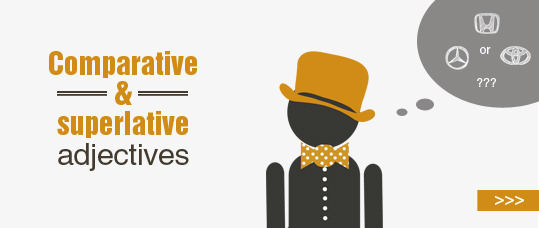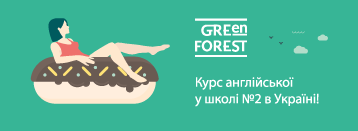Comparative and superlative adjectives
Quite often we compare different things and for that we need to use comparative and superlative adjectives.
We use comparative adjectives to compare two, three or more things.
If we have a one‐syllable adjective, for example, cheap, sweet, rich, to form comparative we add the ending –er.
cheap – cheaper
sweet – sweeter
rich – richer
This computer is cheaper than that laptop.
If we have a one‐syllable adjective that ends in silent –e, we just add –r to comparative form. We don't need to double the letter ‘e'.
strange – stranger
simple – simpler
nice – nicer
Today's test is simpler than last week's one.
If a one‐syllable adjective consists of consonant + vowel + consonant, we double the last letter.
big – bigger
(b – consonant, i –vowel, g – consonant, that matches our rule. And that's why we double the last letter).
hot – hotter
fat – fatter
Yesterday was hotter than today.
If we have two‐ syllable or three‐syllable adjectives, for example, favorite, comfortable, dangerous, we use the word more to form comparatives.
favorite – more favorite
comfortable – more comfortable
dangerous – more dangerous
What is more dangerous to ski or to snowboard?
If a two‐ or three‐syllable adjective ends in consonant + ‐y we change the ending -y into -ier.
tasty – tastier
friendly – friendlier
smelly – smellier
Jinnah is friendlier than her sister Kate.
In a sentence when we want to compare two things we use than.
Pat is more beautiful than her sister.
It's easier to read than to speak.
This test is simpler than that test.
These apples are more expensive than those apples.
We can use the word ‘one' to replace a singular noun and ‘ones' to replace plural nouns when we don't want to say the same word the second time.
This test is simpler than that test.
It is better to say:
This test is simpler than that one.
These apples are more expensive than those apples.
It will sound better:
These apples are more expensive than those ones.
Superlative adjectives are used to compare one thing with all the others.
Let's learn how to form them.
If we have a one‐syllable adjective, for example, cheap, sweet, rich, to form superlative we add –est.
Also, pay attention that we always use the definite article the before superlative adjectives.
cheap – the cheapest
sweet – the sweetest
rich – the richest
Who is the richest man in the world?
If we have a one‐syllable adjective that ends in silent –e we just add –st to superlative one. We don't double the letter ‘e'.
strange – the strangest
simple – the simplest
nice – the nicest
You are the nicest person I have ever met.
If a one‐syllable adjective consists of consonant + vowel + consonant, we double the last letter.
big – the biggest
(b – consonant, i –vowel, g – consonant, once again we double the last letter).
hot – the hottest
fat – the fattest
The Pacific Ocean is the biggest ocean in the world.
If we have two‐ syllable or three‐syllable adjectives, for example, favorite, comfortable, dangerous, we use the most to form superlatives.
favorite – the most favorite
comfortable – the most comfortable
dangerous – the most dangerous
This is the most comfortable armchair in this room.
If a two‐ or three‐syllable adjective ends in consonant + y we change the ending y into -iest.
tasty – the tastiest
friendly– the friendliest
smelly – the smelliest
My mum has made the tastiest cake for the yard sale.
There are a few irregular adjectives which you have to learn by heart.
good – better – the best
bad – worse – the worst
far – further – the furthest
Sunday was better than Monday but today on Tuesday is the best day of my life.
Don't worry, your test results could be worse. They were the worst in the class last year.
The USA is the furthest country I have flown to, and it is further from Ukraine than Spain.
Comparatives and superlatives you use in your every day speech.
So, I hope the information was useful for you.
Thanks for listening.
















